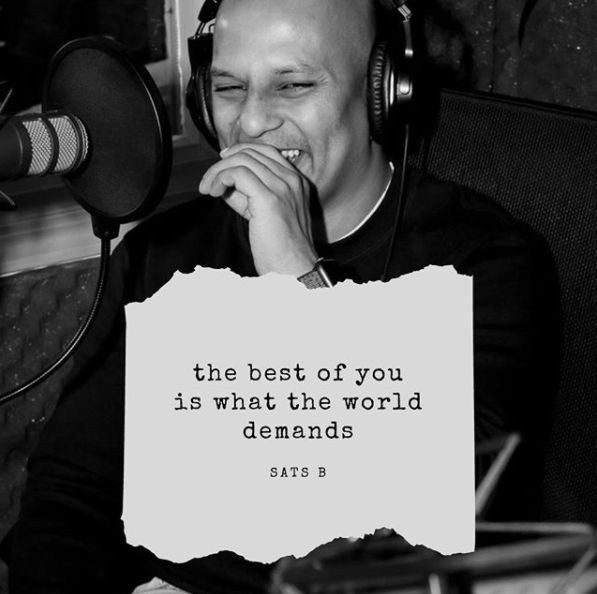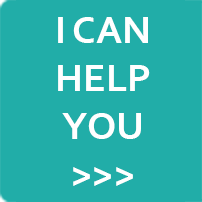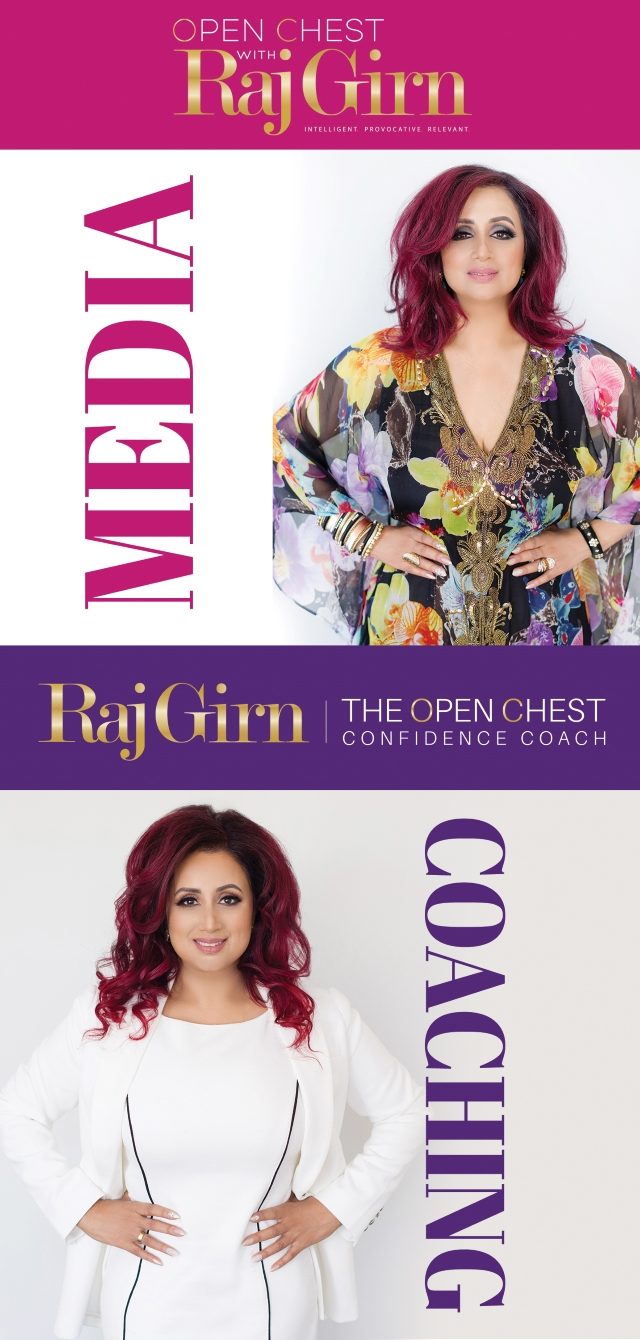I had a conversation with the uber cool, highly unconventional, award-winning, serial entrepreneur Sathish Bala. We talked about how he went from an immigrant mindset to conquering multiple industries and supporting many niches, including musicians and female entrepreneurs! His story screams, hustle, hard work, and honour.
WATCH THE FULL INTERVIEW BELOW . . .
I cannot wait to introduce my fabulous guest. He is definitely somebody that has so much wisdom and experience to lend to all of us. I definitely look up to him in many capacities. Thank you so much for checking in with us. This is going to be a great. A lot to learn, not just for me, but for you guys as well. So welcome to another edition of Open Chest with Raj Girn Live. Today’s topic is how to pivot online and build a successful business.
My guest today is noted award-winning serial entrepreneur Sathish Bala. He was born in Chennai, lived in Singapore in his early years and grew up in Toronto, where he currently resides. His journey has not been one of silver spoons or privileged opportunities, but rather one of creating a vision of himself from scratch, which aligned with his core value system that includes a strong work ethic, hustle-hard mentality and lifting up those who need it the most.
During his twenty-five years in entrepreneurship, he has successfully built and exited three digital start-ups that he credits to his ability to market ideas, to build relationships and teams across Canada, India and South America and close millions of dollars of revenue. A couple of his noted credits are one being the founder of desiFEST, Canada’s largest and longest running South Asian Music Festival, which has raised over two million dollars in private and public funding, has hosted over fifty thousand visitors annually while supporting over 500 artists since inception in 2007. Two, launching The Bala Group in 2019 to support minority and female entrepreneurs in building socially impactful emerging technology solutions to some of the world’s most pressing problems. Please give it up for my friend, the fabulous Sathish Bala. Thank you so much for making time to be on today, sweetheart. This is such a privilege and an honour to spend the next 50 minutes with a man I admire.
Thank you. What an amazing introduction. I was getting goosebumps as you were talking about it. And sometimes, you take your own history for granted because you don’t see all the positives. You see all the pains and the struggles. And then when somebody like you, who I admire, and you were so instrumental in my career and we’ve talked about it. It’s nice. And thank you so much for that wonderful introduction.
HOW HIS JOURNEY BEGAN. . .
Absolutely, sweetheart. There is so much I want to talk to you about. Selfishly, for myself and for the global community, I want to be able to garner some insights from your many years of experience. Before we actually talk about you kind of going into the calling of entrepreneurship. Let’s go back and get some perspective, Sathish, on who you were as an identity prior to becoming kind of this serial entrepreneur. Take us back to your early days. Maybe give us a few milestones to let us know how you’ve journeyed along on your personal endeavors to go from that immigrant mindset to kind of the man that you’ve become today.
Yeah, that’s a really good question. I love talking about that because I feel like so much of who I am today in many ways was an angry reaction to who I thought I was and the life that I was given. I was born in Chennai and my parents being in chase of a better life. My dad comes from a big, long family like eleven siblings. I happened to be the leader of the clan, the first one born, which all of these are unspoken pressures, you know you didn’t choose any of it. They had this really big goal, you know, their first son is going to be this and that. And I said, okay, you know, when I was born very quickly, they realize that I’m not the guy that they thought I was and academically I wasn’t as smart. And in the culture academics comes first. From the age of like 2 or 3, all the way up to 14, we moved from India to Singapore in chase of a better life.
School and I never got along. It’s just something that never resonated with me. Partly because I’m always trying to figure out, like, why am I doing what I’m doing? And today it’s enlightenment and all this stuff but back then, you’re just an annoying, troubling kid. Because you’re like, I don’t get it. I don’t get it. What am I doing? I wasn’t, like, dumb or smart. I just chose not to care because I didn’t understand it. A lot of the learning disabilities that we know today weren’t prevalent back then. We didn’t know about them. So, they just thought I was this troublesome kid that didn’t know how to study, and they tried to beat it out of you for the first, I think 13, 14 years of my life. Once my parents and the community couldn’t figure out how to get me to be who they want, the easiest thing was to ignore you and discount you. So, the first version in my life was really confusing because I’m like, man, how come I suck at everything? How come the people I look up to, mom, dad, teachers, you know, relatives, were all telling me that I’m dumb and stupid? And then, of course, the icing on the cake in Singapore at the age of 13, you do a national test. The outcome of that test determines whether you’re blue collar, white collar, what’s your future? And so I took it. And, of course, you know, a piece of paper comes from the government.
It’s almost legitimizing everything, right?
Yeah, the ultimate paper, like, you know, mom, dad, cool. I hate you. Whatever, whatever. But then the little country sends the paperwork to your house saying, ‘hey, your son is destined for a blue-collar lifestyle and my parents were crushed. For me, it was like, ‘okay, if this is my destiny and everybody that said I am going to be this kid, why would I doubt it? Because I don’t doubt everything else they say. So, everything else must be true.’ I go into a fortune teller, right? They’ll tell like five good things and one thing that you don’t like and you’re like, well, which one is true. So that was my head space. In reaction to that report and sort of embarrassment and they wanted to leave the country, we came to Canada.
Wow, really, I’m going to stop for a second. They left the country because of that?
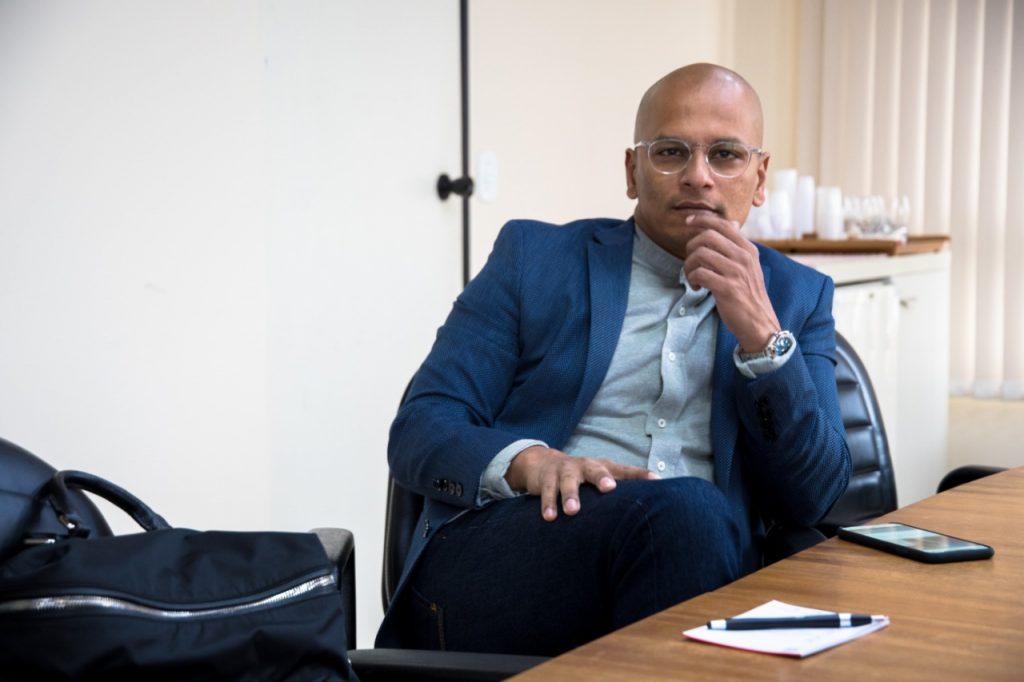
Oh, 100%.
What is the matter with our parents? That’s a whole other show. But carry on.
100% because they didn’t know how to deal with it being the eldest son. It’s not just the immediate circle of friends in Singapore. We’re not family, but there’s a back-home expectation of the first family that made it out, the first grandson that’s going to be the big thing or whatever. I’m getting the ripple effect of all this negativity without understanding why I am getting all this stuff? Then we show up and Scarborough and in my head, I’m like, ‘look I’m in a new country, If I stay quiet and if I shut up and I don’t open my mouth, how long can I get away without people discovering that I’m this dumb, stupid kid.’ So, for the first couple of years in Canada, I just didn’t open my mouth. And now you know me, I don’t shut up.
I can’t even imagine the version of you that you’re telling me, knowing the version of you that I’ve known for the last, I believe, 18 odd years. Like, they’re not the same people for me. This is why the perspective on that version of you is so important to tell the story of your success today, you know?
100%. For me, one of the major milestones is giving myself permission to not want to be that guy. There’s a whole bunch of things that happened that I can break through. But essentially for me, I have two lives. I’m 45 today so there’s the 3 to 14 and the kid that got on a plane convinced that I’m destined for a life. I didn’t know if blue collar was good or bad. I just knew this is my life. This is my capacity. This is where I can go. This is how far I can go based on what the people told me. Then the 15-year-old in Scarborough met a different type of influence, different type of mentors, different type of language and label. And that version was completely different. The only thing that changed my life was that I got on a plane.
WHO INFLUENCED AND IMPACTED HIM IN HIS LIFE. . .
Right. So, can you tell us a little bit about that? Who were these influences and why did they impact you at that time when you’ve spent all your life being told that you are everything other than what you were being told now in Scarborough?
Yeah. You know, I’m a parent like you are and as I watch my own behaviour, I realize the first four to five years is when we encourage our kids to do everything, ‘jump between the couches, climb the tree, run free. You could do it!’ Then at some point, we go into ‘no, no, no, don’t do it’ or ‘you’re not good at it. You suck at it.’ You know what I experienced for almost ten years of my life, from the age of three or four, the negativity version where I was told what I’m not good at, nobody told me what I’m good at, what I’m capable of. So, I show up and Scarborough I’m now surrounded by a different ecosystem where they’re saying, ‘hey, you’re a great basketball player. Did you know that?’ Or ‘you’ve got this really cool, charismatic personality’ or ‘we love how you tell stories’ or ‘you’re a natural leader. Nobody’s saying you’re shitty in math or English or science.
I’m like, wait a second. If I’m potentially charismatic, have leadership qualities and inspire people. I’m fun to be around. I’m a nice guy. You like me. Then who’s the other guy? If I believed everybody else, because they were older and wiser and the people telling me this new version of me are teachers and guidance counsellors and other parents that are meeting me through their kids and they’re older and wiser. Well, who the hell is right now? If both versions are created by other people and I get to believe it. At 15, I was like, what version do I want to believe? That created the very first crack in my belief system.
Around who you were and your worth.
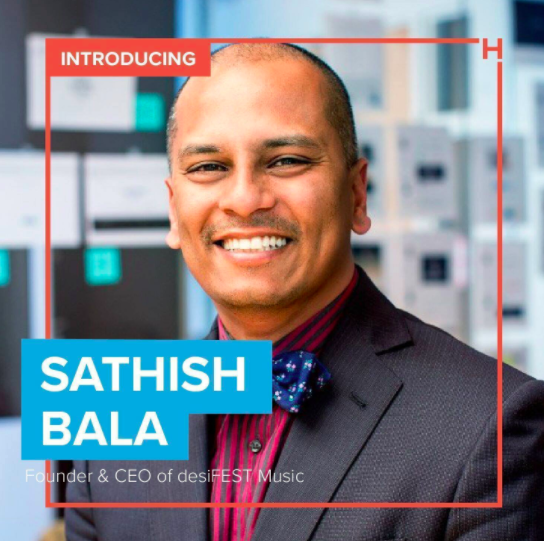
And the ability to manifest whatever version I want, because if I can believe your version or my parent’s version, well, why can’t I believe my own version? I’ve never asked that question before. Who am I?
And when did you start asking that question, Sathish?
Grade 9 changed my life. Because grade 8, we came in 1989 which was the second half of grade 8. And I didn’t speak a word to anybody because I was just like, ‘hey, I don’t want to let anybody know I’m dumb, so if I’m just quiet, I can get by.’ Then one of the first monumental moments in my life, grade 8 English, we were reading Macbeth, everybody had to stand up and read. And I come from Singapore so English is my first language. Nobody knew that, they saw this Indian kid and they just assumed I’m from India and I don’t know the language. So, I’m shy. The teacher, God bless her, said, ‘look, today you’re going to read. It’s going to be one minute, you’re going to read two pages, even if you stutter, even if you can’t pronounce the words, you have to stand up and do it.’ I was like 13th in the row, right? So, everybody that got up to read a page, my heart beats getting louder and louder and louder and I know I have to do it. It felt like I’m going to die because I’m about to stand up and do something in front of 13 people.
Fast forward 20 years later, I’m in front of hundreds of thousands of people. I stand up. I open the book. I read my two pages. What felt like an eternity was like 30 seconds. I sit down. I’m feeling uncomfortable, I’m sweating. At the end of the class, the teachers like, ‘can I talk to you for a second?’ So, I go and she’s like, ‘look, you could speak English and it was flawless and there was no accent. So why aren’t you talking?’ I told her a little bit about what happened and how I feel. She looked at me and said, ‘look, you got on a plane, whatever you believed, leave it at the airport. You can now believe a different story and what I saw was a young man who stood up, beat his fear, read something in front of a class, and that is the person you should start to believe in who you are. That busted open everything about me, man.
And what did you discover about yourself at that point? Maybe some words that described who you were starting to become at that time?
I didn’t think I had words, but I think I had this feeling of happiness for the first time. That there’s a potential for who I wanted to become and that the life that I’ve been handed wasn’t a solid cemented rock and that the truth in my head is only in my head and that my greatest gift is my mind.
Contrary to what people were telling you, right?
Exactly. If I can to nurture it. If I can understand what’s going on up here. Then I can control my own narrative. Nobody has ever said that was an option for me. I didn’t know how I was going to do it, but the fact that there’s a potential became a very interesting opportunity for me and for the rest of the next 20 years. Until today I’ve been life hacking and unlearning, and as fast as I learn new things, I have to go remove the first 14 years that’s got this permanent stain. It’s a constant battle. But I want to be in that battle because I win more than I lose. And that’s okay.
Right. So how much of that stain would you say at this point in your life have you been able to erase?
I think it’s a shadow. I think I started off by trying to think about how to erase it, become a different person, and I realized I can’t get rid of that person. But I got to battle that person. And that’s the fuel, you know, when I’m too high on myself because we all get that ego moment. That version, the 14-year-old version humbles me. When I’m low, I see the change I’ve been able to make. So, I decided not to get rid of that person and suppress it, but really make it an ally. How can I live with my shadow?
HOW HE TRANSFORMED HIS IMMIGRANT MINDSET TO ABUNDANCE MINDSET. . .
Right. Wow. That’s so profound and it begs so many other questions. But I just want to make sure that, you know, our global audience here is getting the value of what I know to be who you are. I know that you’re going to hate me saying this, but you’re a brand. You’re a brand in into yourself because of all the different things that you’ve been able to accomplish. Now, I want to give people kind of a view behind the velvet rope of some of the things that you’ve accomplished Sathish just because these are things that you can’t learn in school, like there’s no one out there teaching this in academia. It’s kind of a testament to what you talked about earlier, that academia wasn’t your strong point. And thank God it wasn’t, because maybe you would have been on a different track in your life at that time.
Let me ask you this. Our parents being immigrants, they have a specific mindset. They have the immigrant mindset where it’s about survival and they stay within a contained box that allows them to accomplish just that. You and I have lived outside of that box because we’re entrepreneurs and, you know, we don’t know how to fit into a box that’s been created by someone else, even though we have both been brought up in that box. Can you share with everyone how you’ve kind of transformed yourself from the immigrant mindset narrative that our parents conditioned us with to this kind of abundance mindset of everything and anything is possible. If you can visualize it, you can find ways to accomplish it. Talk to us a little bit about that.
Yeah, I think it’s a great question and I think it’s a bit of a marathon. Creating belief systems doesn’t happen overnight. Momentary milestones reinforce the belief system. For me, the very first thing I needed to figure out is what is my truth? We don’t get a lot of moments alone in life, right? But the two moments that are alone for me that I guard is my mornings when I’m brushing my teeth and I’m getting ready. That’s me and me. And the few minutes before I go to bed is my most authentic moment of the day, and for me, I seek the truth in that moment. Who do I want to become? What are my fears? Why do I want to become that person? And when we go back to the 15, 17-year-old version of myself and I’m starting to ask these questions. I realized that if I can dream of a huge, amazing, valuable life, the skill which I want to live that life, I’m not paying anybody to dream. I’m literally dreaming myself and there’s no cost to it. So why would I dream small?
Let me think. How can I be on a stage in front of a 100,000 people? How can I build a great company that hires hundreds of people? How can I be international? How can I be the mayor one day? Why not? Because we’re dreaming and one way for me to really think about being abundant is challenging my brain to think of ideas that it doesn’t understand. One of the things that I always talk about is when you dream small, when you play small you battle your history because your history is there to tell you all the things you can’t do. You’re an immigrant, you can’t do that, you’re brown, he can’t go far, you’re 5’5, you’re this, you’re that, right? So, when you dream small enough and your history can line it up to go nah you’ve had three bad companies already, why would you want another global company? Or you’ve had 19 club nights that are horrible, why would you want to do a festival? But when you dream huge, it’s like I want to be an international brand. I want to be a best-selling author. I want to be a mayor. I want to do big.
Your brain doesn’t know how to deal with that level of thinking. When I realized that, I started to really 10x all my goals. When I went to university, for example, I was like, ‘okay, I’m getting an education, but where can I 10x? Well, why can’t I be the student body president?’ And this is early 90s and Ryerson. There’s not a lot of brown representation. I’m in computer science. I said, ‘okay, so?’ It took a year to build the brand, as you said. Then I ran for student body president and I won. And I was the student body president for fourth year at Ryerson.
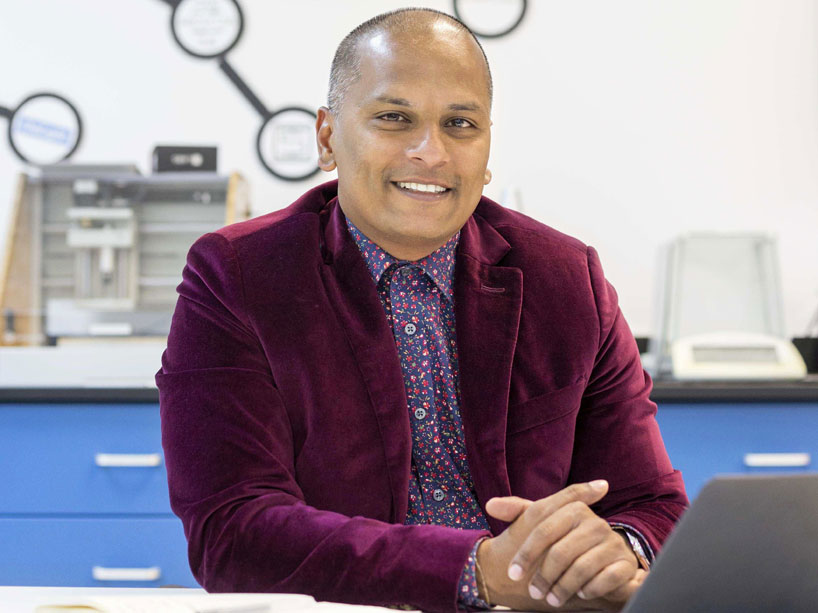
Wow, that’s great.
But if I wanted to just be a volunteer or if I just wanted to participate, my fear and my imposter syndrome and my 14-year-old would be like, ‘nah, they’re going to not like you. You’re dumb, you’re not going to happen.’ But it was such a big idea. I wanted to be student body president. The worst of my past can’t hurt me. It’s the same thing I did with desiFEST. It couldn’t be just a small banquet hall club night show. It had to be Yonge & Dundas Square centre of the city big. We didn’t want to just do Toronto; our first three years was four cities. It was so big that my history wasn’t going to hurt me.
To answer your question of like, how do you develop this mind of thinking abundance is to give yourself the confidence and believe in your truth, to dream big and know that by dreaming big, you train your mind to not bring the fear forward. And that starts the conversation of, okay, if I can manifest this now, what have I got to do? What are my gaps that I need to get better at before I can get on a big stage or run a big company or become a student body president? It wasn’t an overnight thing. I spent 12 months in third year getting ready for it for fourth year, right? So that’s sort of the secret sauce, man. You got to think much bigger than your capability.
People will say, well, how do I think big? And that’s when you look for inspiration, right? Shout out to you! You’re one of the very few people that I reached out immediately for year one. I reached out to you, I reached out to Baba Kahn, I reached out to Mohit, I reached out to Veronica. People that had no idea who I was. I said, ‘hey, I’ve got this crazy big festival idea. You don’t know me, but I respect what you’ve done, which is 10x where I was. Can I get some help? Can I get some advice?’ And everybody that I reached out to could have also said, ‘who are you? You’re doing some club night things. We don’t know who you are. Peace out. Or say, ‘man, I’m going to help this young person.’ Then by pulling me into your world, I was able to now think like you and I was able to now manifest a bigger version. I didn’t know how to do myself. So that’s my second thing I tell people you dream big and then look for people that are already at that level. Reach out and say, I want to get there. Can you help me?
Right, exactly. There are so many key things that you said there. You talked about not allowing fear to overcome who you are and who you need to be, thinking bigger than you could possibly ever imagine that you could become. And then reaching out to people that can help you get to where you want to get to. There’s so many important things that you’ve said there, Sathish. And it gives you this real sense of the fact that at the core of the foundation of who you are as a person, as an identity, as a human, as a brand, as a man, is that you are an entrepreneur.
At what point because this is something, as you know, South Asians as any strong culture does, it pushes you in into the kind of the safe zone, the corporate zone, right? Why did you decide that entrepreneurship was where you needed to be, where your calling was, where the greatest impact is that you could have made versus going the corporate realm because you did get your degree?
That’s a great question. A series of things that led to it, the first thing was by the time I was in university, I already realized that I wanted to continue this life hacking, meaning I’m never going to let somebody else tell me what I’m good at. That was my first 14 years. And I’ve been breaking my roadblocks already. I’m studying things. I’m becoming student body president, all this kind of stuff. So, I thought, why would I stop now and all of a sudden work on a resume so somebody who doesn’t know anything about me will evaluate me on a digit, which is GPA and decide whether they want to give me a job or not. That made no sense to me. So, getting a job, which at my core, wasn’t something I was interested in doing.
What I didn’t know is there was something called entrepreneurship. Back then it was unemployment. I was like, man, I’m going to be an educated, unemployed dude. Not sure what I’m going to do. And that was my thought pattern. God’s got a great way of reminding you. In my moment of weakness, because my parents are pressuring me and things like that, I said, okay, I’m going to apply. I’m going to make my parents happy because I’ve been such a rebel torturing them most of my life. How do I help them?
So, I put a resume together, which really had nothing. I’m doing pretty good in school, not top of the class. And I applied. I went to KPMG. They came for the tour thing, Anderson Consulting back then. The first person to respond back is KPMG. And thank God, because he was like, ‘look, we see what you’re doing. But the grade average is not there. You don’t have a lot of extracurricular thing other than like basketball and music. You’re not part of any computer clubs and all the stuff is not the right fit.’ And I was like, this is exactly why I didn’t want to do this stuff. It was exactly why I needed the reminder that your opinion of what I’m good at is not important because what I’m hearing on the other side is, man, I’m a dope DJ. I’m making money with club gigs and I’m student body president. I’ve got contacts, I’m learning stuff like, why am I going to sacrifice all that to sit in a cubicle?
But it’s a hard decision, Sathish, because, you know, it’s like it’s giving up regular money versus the hope of a better life-long term versus the short term. Like, how did you come to terms with that narrative in your head?
I think because we grew up poor, I already knew how to live without much in life. I didn’t have a vision of what living comfortably was yet. I didn’t have a vision of having money in my pocket. If I’m already in the dirt staying there longer didn’t really impact me. You know, I was already living off hot dogs three times a day and ramen noodles for luxury. I didn’t know what I was going to miss if I stayed unemployed and pursued my passion and just sort of stayed on this life hacking. I’ve also become at that point, really addicted to the person I was becoming.
By the time I’m graduating, this is like 1998, 1999, I’ve had ten years since the fifteen-year-old. I’m rocking parties. I’m confident, I’m talking to girls, I’m dating. I’m smiling, I’ve shaved my head, you know I’ve got a different look so I like that ability to constantly challenge my fears and attack something and I felt like it was going to be dumbed down because I’m going to go chase the paycheque every two weeks. I was convinced that I’m not going to get a job, but I still had to figure out how to make money. One of the things that I wanted to do is look at if I’m studying computer science and everybody wanted to be a programmer, well, what can I do with the skill?
That’s where the entrepreneur hustle mindset, which we didn’t know what it was called back then, I said, ‘okay, maybe I want to solve a company’s problem, how can I solve everybody’s problem?’ And this is the time when like it was the pre-Y2K people are still using those yellow address books. I knew that everybody needed to go online. So, I said, ‘okay, I’m going to figure out how to help a bunch of people move their businesses online into horrible looking black and white websites but I don’t need a lot of money, so I’ll charge and maybe somebody who will hire me because of my other skills.’ So, my fourth year and this is a five-year program, the summer of my fourth year. I started calling people saying, ‘hey, I’m in computer science, I know the future, your business will be better online and you know, you can pay me what you can pay me or I’ll give you a free website. If you want a free website, then behind the invoice, I would put the list of all the other classmates. Here’s the other 150 people that are going to graduate with me, if you like what I did and if you’re going to hire anybody for your business, hire me and not these 149 people. [laughs]
HOW HE SUCCESSFULLY EXITED HIS BUSINESSES. . .
Oh, I love it. Let’s talk about the three businesses you founded and successfully exited. I mean, that sentence alone begs like an entire show, but let’s kind of encapsulate it so that we can give some true values to people who are, you know, tuning in. What were the businesses that you had and how did you set them up to successfully exit?
Yeah. And let’s also break down the idea of exit. The definition of exit is billions of dollars, you’re out. For me, the exit mindset from always the beginning is how do I gracefully leave an idea when it’s no longer valuable to me or am I valuable to it? So, the first experience was Spyder Designs, my very first company that I started in university. We started it for a variety of reasons. It certainly wasn’t money, but it was to sort of life hack, learn how to pitch sales and all this stuff. By the time we were finishing year four getting into year five, it was already a couple hundred-thousand-dollar business without planning. What I learned is I had no leadership skills. I had no idea how to build a team. I had no idea how to connect the solution and concept. When we exited the company, we exited the company because we didn’t know how to build a company. We had profit. My two co-founders wanted to go start their careers and get just a nice hobby. And I was like, man. So, let’s take a profit. We’re debt free. We paid for university already. It was a very interesting exit because I graduated with a company as an entrepreneur with money in my pocket.
That’s a successful exit, Sathish. There are people that exit at multiple millions, even billions, you know this I know this, that don’t have a successful exit. They’re still broke. And there’s all kinds of other things going on in their exit. That’s the other thing that I wanted to bring to the table here and I know that you’re a testament to this and you could speak to it a lot better than I can but making money is not the only criteria for a successful exit.
So, let’s talk a little bit about that, because you kind of just did. Can you kind of recap a little bit on other than money, what else could be determined as a successful exit for those people out there who are in that place and don’t know how to exit beyond the money side of things?
Yeah, 100%. I think we’ve become so emotionally tied to this invisible thing called money. We feel like that’s the be all end all. So, it’s a great story for the second one, right? So, I wanted to continue my entrepreneurial journey. There’s another amazing timing happening. Y2K was happening. Your entire world is going to shut down. I said, ‘great, I have the technology in the background of the team to start a company to help companies not die during Y2K.’ That turned into quite a large company. But I was mentally ready for that company because I’ve already figured out what I wasn’t doing well in my first company.
Now we’re a global shop and I’ve got 20-25 employees and I’m a CEO trying to figure out what to do. There was a sale to the partners, but more importantly I exited because I couldn’t find a way to be creative in my own business. It got big enough where I’m now the money guy. I remember walking into the office one day and people are like, man, if we see you in the office, that means nobody’s out there making us money. That was like, wow, I’m now the glorified sales guy and my value to the company is money, I need to exit. The thing that we chase is the one that became my definition and I didn’t want to be that guy. All the other things that I was doing in the start-up days, culture building, team building, value adding, strategy, all of that was wiped out because I’m now the money guy.
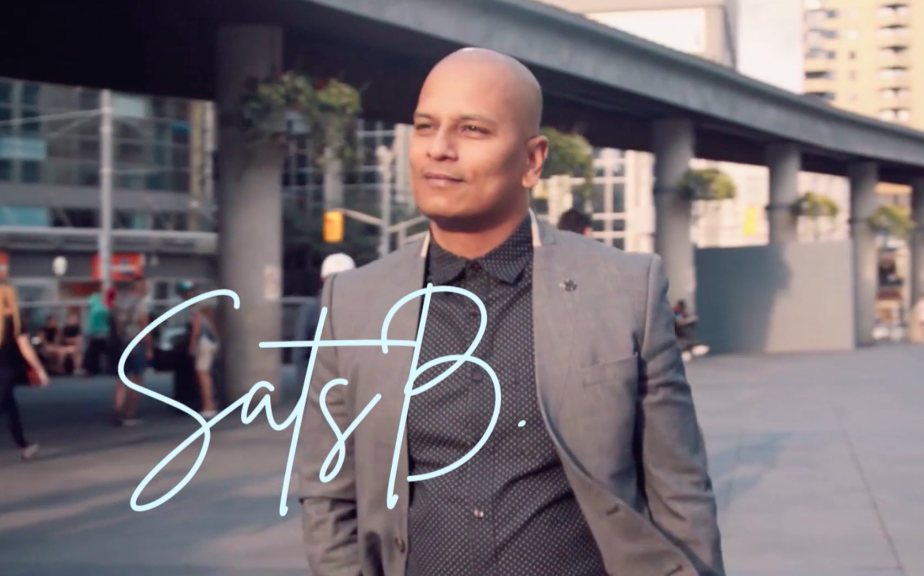
Even though that is a huge skill that you have, Sathish, it’s not the one that gave you the passion to kind of keep that journey going as an entrepreneur because that journey is not for everyone. It’s not for people who don’t have a creative mind and a fearless, you know, trust kind of mindset. It kind of sounds like a juxtaposition, like how can you be successful if you don’t put yourself in every area. But that’s just not the way that you build things. And you’re a testament to that because, you know, what I’m hearing you say is that the first business although you had this great idea and it was successful financially, you didn’t know where to go with it next. So that exit was necessary, and it was a successful exit.
All those pieces that weren’t there with the first one you were able to manage to figure out for the second one. But then you became the corporate guy instead of the creative, visionary entrepreneur that is inherently who you are on a foundational level.
Right. I think what what’s awesome with that comment, and you and I talked about it last time we hung out was why do you want to be an entrepreneur? The thing that you cannot create a business plan for is monetary success. Anybody that says here’s a guaranteed business model, Covid has shown that to us. The best business plans are only good in an idea. So for me, starting my business was always about how can I become a better person? What are the skill sets I want to explore in my own terms? What are the things that I’m scared that I got to sort of put myself in a position like when I was kicked out during my second business because my parents didn’t understand why is this kid working and he’s not home and he’s driving and he doesn’t have a job and he’s out all hours at a time.
Yeah, they didn’t know how to deal with it, so they kicked me out. But the twenty-one-year-old Sathish didn’t have the financial literacy and discipline yet. I didn’t know how to take care of myself. How to cook, clean, I’m a mama’s boy and now all of a sudden, I’m like, ‘wow, I got to learn how to live on my own and run a business and know how to make money.’ But at the end of the day, I need to figure out how to become a better person.
Yeah. That’s a lot of shit, babe. Yeah, that’s a lot to deal with.
I tell anybody who wants to get into entrepreneurship to identify how this business can make you better. All the businesses that I’ve started and helped me become better. Then the bonus on top of that is to make money and you get to build a brand and all that stuff. But if tomorrow desi
FEST dies or Bala Group is gone, I’ll miss the business side of it, but you can never take away the person I’ve become.
Well, the legacy that you left behind, sweetheart, because, you know, it’s the pioneers that created the foundation so that all other creators can see that, I can. I can, too. We didn’t have that. You and I when we started in the game, we didn’t have that other person that had done it. So, we didn’t have kind of this, you know, rule book or guideline book to tell us how to do it because someone else did it this way, therefore, and they succeeded in it.
The only thing I have to add to that is, yeah, you didn’t. But I had people like you.
THE CHALLENGES HE HAD TO OVERCOME. . .
Oh, babe, you just you blessed me. Well, you know, along my journey how many things you try and you’re not successful at. I think this is the other thing that I wanted to talk about as well. People fear failure. And as an entrepreneur, we fail more than we succeed. If you look at it from semantics, but we succeed more than we fail because of the depth of growth and learning and wisdom, resources and opportunities that we garner along the road of this kind of perceived failure. Give me your perspective on that. You know, challenges that you’ve had that you’ve overcome and how have you.
I think what you said is beautiful because, you know, I haven’t failed at anything in life. I’ve in failed in school. Typing class, calculus, I failed in school because somebody said, ‘hey, this is a mark you got to get and if you don’t get it, you fail.’ I haven’t failed in life. I’ve continuously attempted a bunch of things, but an outcome I desired in some cases, I’ve achieved my desired outcome. In some cases, I haven’t achieved the desired outcome and I move on. But you can’t fail in life because the whole point in life is to continue to try things and experiment and learn and give and take and share. We have to remove that narrative, right? So, if we remove that narrative and you know, you can never fail, then where does fear fit in now? The easiest way to remove the fear is to remove the word failure, because what we fear? Failure.
SOME TIPS HE CAN GIVE TO OTHER ENTREPRENEURS. . .
Absolutely 100%. So, let’s take you in a certain direction for those people out there that are listening in. I’m talking to the fabulous serial entrepreneur, award winner, fabulous, fabulous hustle man himself, my boy, Sathish Bala. He is just an incredibly inspiring personality. Those of you who have had the pleasure of having him on this chat with me today know that there’s so many directions I could take this conversation to. But I feel that, you know, knowing who Sathish is and knowing why I do this show, at the end of the day, we want to make sure that people get value from the things that we’ve accomplished in our lives.
So, with that said, for people listening and watching out there, can you share some tips based on your experience? You know, the type that they teach you in school for two types of entrepreneurs. The first one is the one that is the brick and mortar business and they’re looking to pivot online, either to survive or to scale. What are some tips that you can give to that particular type of entrepreneur?
Yeah, and I think across the board, whether you’re bricks and mortar or not or if that’s part of the ecosystem, having a digital footprint is incredibly necessary. You know, we live in a world where online access to your business is more important than having a street address. Those of us that resisted have now been pushed to that. The pandemic has shown us and some of the new behaviours that the pandemic created is not going to go back to normal. So, if you were resisting before, it kind of now have to be in that game.
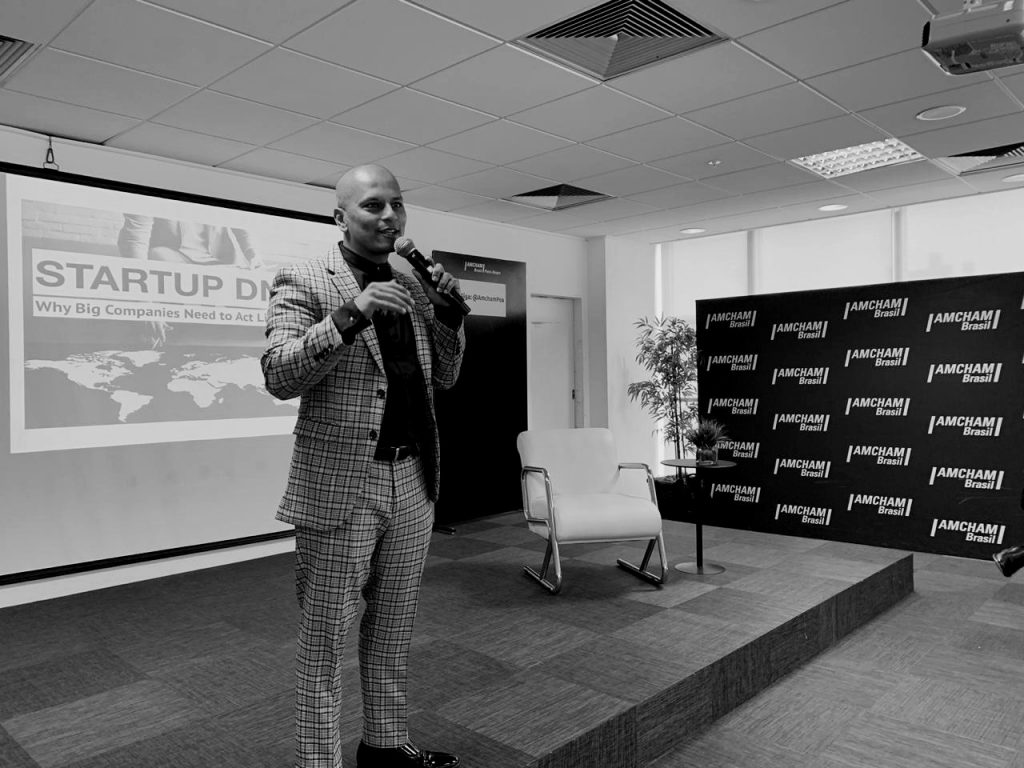
So, what would you say that they should do? Because they have no idea how to pivot from what they’re used to being a physical entity. What are a couple of the things that they should be looking at?
So, the very first thing you should do is map out your customer’s touch points with you. Start right from somebody has a desire for a product or service you’re selling, right? So, let’s take an example of a pen. At some point somebody is like, ‘man, I need to buy a pen because my ink is gone, or I hate this pen.’ So, what do they do? Understand that first behavior. Do they go online and search? Do they ask a friend, do they go on Instagram and look for hashtag pen? How are they identifying they need something you’re selling or offering?
Then look at however they’re going to try to find a solution, are you there? Or is somebody that you’ve already sold to there to tell them about you. And number three, if they now know that you exist, and you’ve got the perfect pen. Then why is your pen better than everybody else? Because somebody might say, ‘hey, man, I got the shiniest pen.’ Somebody might say, ‘I have the nicest colour options.’ Somebody might say, ‘mine is a best seller for the book you’re going to write.’ But they’re all pens with ink in it.
And they all give you a value proposition. It depends which one touches you and that you’re looking for, right?
100%. They used to be this notion of like, there’s too much competition, right? And it was true when the world was this big. Today, your entire market could be Kenya, because they love your pen more than anybody else’s in the world. And that’s what globalization and the digital era has done for us. It’s created markets for us that typically would only be in your neighborhood. Only your closest friends know about you, right? So that’ll be the next step to go, ‘hey, why should they buy my version versus everybody else?’ Then once they are convinced that they should buy from you. Am I making it really easy for them to buy from? I see so many companies where their mobile sites are horrible. Their price is tiny and hidden. Can you make it super, super, super obvious that if I buy a pen and I came to your site and in three seconds I’ve bought it?
As soon as I commit to a relationship with you, can you over invest in my well-being somehow? Are you following up? Are you checking in? Are you taking care of my problem? All of this we used to do in the scope of retail. Somebody walks in, you know them. Hey, what’s up, Raj? Welcome back to the store. That relationship, it gets built over years of time. But now that relationship is still available with Raj but she wants to do it on Instagram. She wants to do it on Facebook. She wants to do it on Twitter. There’s also this misconception that everybody needs a website. If your audience loves being with you on Twitter, you have no reason to have a bloody website. Go all in and live where you can solve a problem. Really, the point of being in business is to solve a problem. Not because you have an address or a business card. To solve a problem. So, where can you solve the most amount of problem which will lead to the most amount of money.
Absolutely. Wow. You know, that’s a lot of information. Guys, I hope you are scribbling it all down or recording it. But if you’re not, don’t worry, because this will be resident in another day or so on IGTV here at Raj Girn, also on Facebook Raj Girn, you’ll see it there as well. So don’t worry if you’re missing out on writing all this down because like me, you’re just kind of enthralled and encapsulated by every single word coming out of this wonderful man’s mouth. Don’t worry, it’s all recorded. And you’ll get the opportunity to stop and write as you please in another couple of days when we put this out and post it indefinitely.
The second type of entrepreneur is the entrepreneur that wants to do a start-up but has no experience but has the best bloody idea that the world didn’t know they needed that he or she wants to put out there. A few action steps to doing it in the right order because that’s also important.
Yeah, 100 percent. And you know, my business, if I can self-plug for a quick second, that’s where I wanted to focus most of my attention. You know, when I sold the company and I was like, ‘what do I do next?’ I realize so many people from our community, people of colour, minorities and female founders. Zero to MVP is a cultural roadblock for us. We don’t have any support. We don’t have any blueprint to follow. Once we make it a little bit, everybody wants the line up to amplify it. There are not enough people in that zero to MVP and you know exactly what I’m talking about. And so, in that space where you’re like, ‘man, I have an idea and I want to get it into the world.’
I ask everybody I meet two things. One, ask yourself five times in a row, why do I want to do this? The first one will be fluff. The second one will get a little bit deeper. The third one will be the version that you think everybody wants to hear. The fourth and fifth is when you really get detailed to why you want to start this business. It’s no longer about you, no longer about your family, is no longer about the ego. It’s about who do I really want to serve. Most entrepreneurs that do it for the wrong reasons get anxiety and frustrated and angry by the time they get to the fourth why. Because the answer is not deep enough. So, I always tell everybody, if you get to the five, you’ve got a good starting point. The second is really invest the time and energy to go to market with something that you can test to see if the solution you’re bringing to market, somebody will buy. You know, in our coaching practice, we have 0 to 90 day practice where if in 0 to 90 days, we can’t take a version of the solution, put it into market and sell it and somebody will buy it, forget it. So, you have to do the 90 day test because if you can’t sell something in 90 days, not enough people want it.
HOW PEOPLE CAN CONTACT HIM FOR ASSISTANCE IN THEIR BUSINESS. . .
So, I got to ask you this because I know that the whole world out there is going to want to know. How can people contact you for this and what are the other things that people can contact you for? Let’s just put it out there.
Look, my five whys is to take all of my scars and blueprints and help as many people as possible get past their little 14-year-old version. The person that holds them back. I want to help you live with that person. I want to help you figure out how you don’t have one life, you can live as many lives as you want if you have the courage to dream it and put in the work. And you and I know you got to put in the work, you can’t manifest stuff by sitting in a room saying, ‘oh, I want some stuff.’
So Bala Group, which we launched a couple of years ago. Literally, the program is whether you’re starting a company whether you’re pivoting from nine to five to your own company, whether you started a company and you’re stuck, and you don’t have a blueprint or representation, you can follow. That’s what we’re about. My goal is to get a hundred people of colour and minority and female founders into that million-dollar category so that we could change the game from inside. We can change the game from the other side of what success looks like and create that opportunity for other people.
So, if you’re stuck, if you need mentoring, if you need help, you need a blueprint or if you need to just be around people that know what you’re going through. That’s what I do. You can connect through Instagram. I mean, I’ve made it a priority to openly share as much as I can. So, I’m as public as it gets.
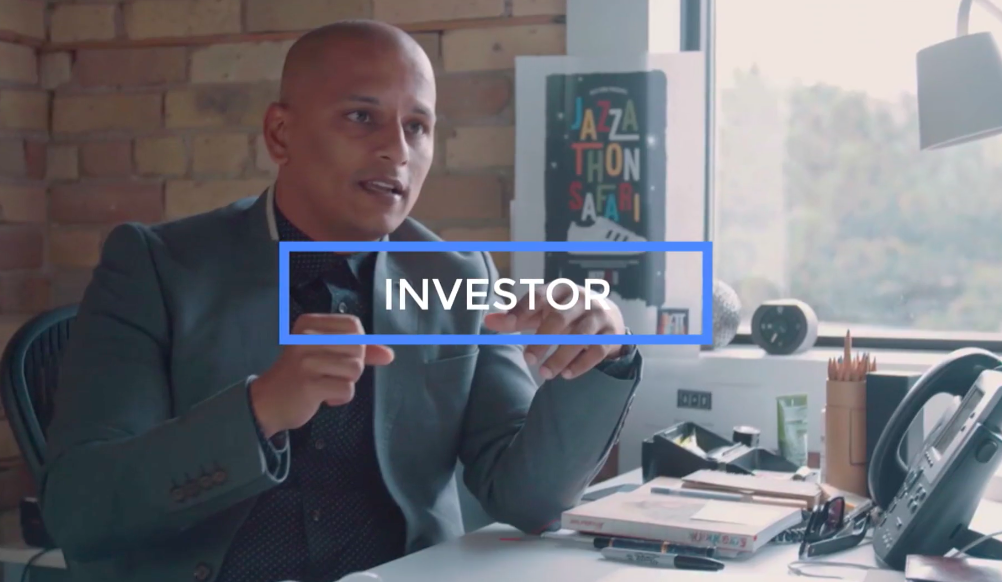
Yeah, you are. And you’re there daily sharing your wisdom with people. Sathish, other than your social media, how else can people get hold of you? Is there a website? Where do they need to go to be able to get more from you?
Yeah, head to Bala.group and all of our podcasts, all of our blogs, all of our free things. We’re doing a seven-day gratitude challenge right now for free. Really in seven days you can change your entire mindset. And if you do it in seven days, you’ll do for the rest of your life. And being grateful every morning is a game changer. And I already know you know this.
Yes, I definitely do, sweetheart. And you know, we’ve come to the end of our chat and you know that you’ve got to come back. There’s so much more that we need to talk about before I let you go, just so people can understand in a nutshell what it means to be transformational for yourself and you need to understand that before you can change anyone else’s lives. That 14-year-old version of you Sathish, if you were to describe that person in three words, just three words, who was he?
Confused, ashamed, and scared.
Today’s version of Sathish Bala in three words, who is he?
Optimism, love and hope.
And a man that I truly respect, and I adore. And I thank you so, so much for the time that you’ve spent with me. I just feel that we have so much more that we need to talk about with you. Come on again because I just feel that everybody needs some more Sathish Bala in their lives.
I appreciate your time. And it means a lot that I got to spend some time with you in these crazy times.
Absolutely sweet. And for people like you and I, it’s so hard. It’s so hard to be social distancing even for one day, let alone for pretty much a whole year. But it is what it is. We get to see each other and share beautiful time together like this. And I want to do it again. Thank you so much to the Instagram family and to the Facebook family. Please go out. I encourage you to go and support Sathish, check him out on all his social media. He’s on there every day giving free advice. Guys, you got to do it. And if you want more, just go to his website Bala.group. Thank you, my love.
Thank you so much.
